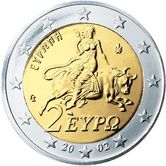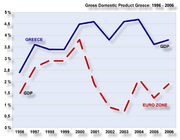Economy of Greece
| Economy of Greece | |
|---|---|
 |
|
| Rank | 28th (2006) |
| Currency | 1 euro = 100 cents |
| Fiscal year | Calendar year |
| Trade organisations | EU, WTO, OECD and BSEC |
| Statistics | |
| GDP | $343 billion (nominal, 2008 est.) 339.2 billion (PPP, 2008 est.)[1] |
| GDP growth | −2.0% (2009)[2] |
| GDP per capita | $32,100 (nominal 2008 est.); $30,856 (PPP 2009 est.) |
| GDP by sector | agriculture: 3.4%; industry: 20.8%; services: 75.8% (2009 est.) |
| Inflation (CPI) | 1% (2009 est.) |
| Population below poverty line |
< 2.0% (2009) |
| Gini index | 33 (2005) |
| Labour force | 5.01 million (2009 est.) |
| Labour force by occupation |
agriculture: 12.4%; industry: 22.4%; services: 65.1% (2005 est.) |
| Unemployment | 9.8% (October 2009)[3] |
| Main industries | tourism; shipping; Industrial products, food and tobacco processing, textiles; chemicals, metal products; mining, petroleum |
| External | |
| Exports | $18.64 billion (2009 est.) |
| Export goods | food and beverages, manufactured goods, petroleum products, chemicals, textiles |
| Main export partners | Italy 11.5%, Germany 10.5%, Bulgaria 7.1%, Cyprus 6.2%, US 5%, UK 4.7%, Romania 4.4% (2008) |
| Imports | $61.47 billion (2009 est.) |
| Import goods | machinery, transport equipment, fuels, chemicals |
| Main import partners | Germany 12.1%, Italy 11.7%, Russia 7.4%, China 5.6%, France 5.1%, Netherlands 4.7% (2008) |
| Gross external debt | $552.8 billion (30 June 2009) |
| Public finances | |
| Public debt | $405.7 billion (113% of GDP)[4] |
| Revenues | $108.7 billion (2009 est.) |
| Expenses | $145.2 billion (2009 est.) |
| Foreign reserves | $3.473 billion (31 December 2008 est.) |
| Main data source: CIA World Fact Book All values, unless otherwise stated, are in US dollars |
|
The economy of Greece is the twenty-seventh largest economy in the world by nominal gross domestic product (GDP) and the thirty-third largest by purchasing power parity, according to the data given by the International Monetary Fund for the year 2008. Its GDP per capita is the 25th highest in the world, while its GDP PPP per capita is also the 25th. Greece is a member of the OECD, the World Trade Organization, the Black Sea Economic Cooperation, the European Union and the Eurozone.
The Greek economy is a developed economy with the 22nd highest standard of living in the world.[5] The public sector accounts for about 40% of GDP. The service sector contributes 75.8% of the total GDP, industry 20.8% and agriculture 3.4%. Greece is the twenty-fourth most globalized country in the world and is classified as a high income economy.
Contents |
History

The evolution of the Greek economy during the 19th century (a period that transformed a large part of the world due to the Industrial revolution) has been little researched. Recent research[6] examines the gradual development of industry and further development of shipping in a predominantly agricultural economy, calculating an average rate of per capita GDP growth between 1833 and 1911 that was only slightly lower than that of Western European nations. Other studies support this view, providing comparative measures of standard of living. The per capita income (in purchasing power terms) of Greece was 65% that of France in 1850, 56% in 1890, 62% in 1938,[7][8] 75% in 1980, 90% in 2007, 96.4% in 2008, 97.9% in 2009 and larger than countries such as South Korea, Italy, and Israel.[9] The country's post-World War II development has largely been connected with the Greek economic miracle.
In 2004, Eurostat, the statistical arm of the European Commission, after an audit performed by the New Democracy government, revealed that the budgetary statistics on the basis of which Greece joined the European monetary union (budget deficit was one of four key criteria for entry), had been massively under-reported by the previous Greek government (mostly by not recording a large share of military expenses - although it was claimed that the differences were due to accounting practices, i.e., recording expenses when material was received rather than when ordered).[10] However, even according to the revised budget deficit numbers calculated according to the methodology in force at the time of Greece's application for entry into the Eurozone, the criteria for entry had been met.[11] Official Eurostat calculation according to the current methodology is still pending for the 1999 budget deficit (entry application reference year); according to the same calculations, the budget deficit criterions were met in 2006.
The Greek economy
Greece is a developed country, with a high standard of living and "very high" Human Development Index, ranking 25th in the world in 2007,[12] and 22nd on The Economist's 2005 worldwide quality-of-life index.[5] According to Eurostat data, GDP per inhabitant in purchasing power standards (PPS) stood at 95 per cent of the EU average in 2008.[13] Greece's main industries are tourism, shipping, industrial products, food and tobacco processing, textiles, chemicals, metal products, mining and petroleum. Greece's GDP growth has also, as an average, since the early 1990s been higher than the EU average. However, the Greek economy also faces significant problems, including rising unemployment levels, inefficient bureaucracy, tax evasion and corruption.[14][15]
In 2009, Greece had the EU's second lowest Index of Economic Freedom (after Poland), ranking 81st in the world.[16] The country suffers from high levels of political and economic corruption and low global competitiveness compared to its EU partners.[17][18]
Although remaining above the euro area average, economic growth turned negative in 2009 for the first time since 1993.[19] An indication of the trend of over-lending in recent years is the fact that the ratio of loans to savings exceeded 100% during the first half of the year.[20]
By the end of 2009, as a result of a combination of international (financial crisis) and local (uncontrolled spending prior to the October 2009 national elections) factors, the Greek economy faced its most severe crisis since 1993, with the second highest budget deficit (after Ireland) as well as the second highest debt (after Italy) to GDP ratio in the EU. The 2009 budget deficit stood at 13.6% of GDP. This, and rising debt levels (115% of GDP in 2009) led to rising borrowing costs, resulting in a severe economic crisis.[21] Greece has been accused of trying to cover up the extent of its massive budget deficit in the wake of the global financial crisis.[22] This resulted from the massive revision of the 2009 budget deficit forecast by the new Socialist government elected in October 2009, from "6-8%" (estimated by the previous government) to 12.7% (later revised to 13.6%). This revision (which, as claimed by members of the previous government, at least in part reflected the Socialists' failure to control tax collection during their first months in office) has seriously undermined Greece's credibility leading to higher borrowing costs for Greece.
The Greek labor force totals 4.9 million, and on average work the second most hours per year amongst OECD countries, after South Korea.[23] The Groningen Growth & Development Centre has published a poll revealing that between 1995 and 2005, Greece was the country whose workers worked the most hours/year among European nations; Greeks worked an average of 1,900 hours per year, followed by the Spanish (average of 1,800 hours/year).[24]
2010 debt crisis
In the first weeks of 2010, there was renewed anxiety about excessive national debt. The CEE Council has argued that the predicament some mainland EU countries find themselves in today is the result of a combination of factors, including over-expansion of the eurozone, and a combination of monetarist policy, tax evasion, [25] pursued by local policy makers and EU central bankers.[26]
Some senior German policy makers went as far as to say that emergency bailouts should bring harsh penalties to EU aid recipients such as Greece. However, such plans have been described as unacceptable infringements on the sovereignty of eurozone member states[27] and are opposed by key EU nations such as France.
Some politicians, notably Angela Merkel have sought to attribute some of the blame for the crisis to hedge funds and other "speculators" stating that "institutions bailed out with public funds are exploiting the budget crisis in Greece and elsewhere".[28]
On 23 April 2010, the Greek government requested that the EU/IMF bailout package (made of relatively high-interest loans) be activated.[29] The IMF had said it was "prepared to move expeditiously on this request".[30] The initial size of the loan package was €45 billion ($61 billion) and its first instalment covered €8.5 billion of Greek bonds that became due for repayment.[31] On 27 April 2010, the Greek debt rating was decreased to BB+ (a 'junk' status) by Standard & Poor's amidst fears of default by the Greek government.[32][33] The yield of the Greek two-year bond reached 15.3% in the secondary market.[34] Standard & Poor's estimates that in the event of default investors would lose 30–50% of their money.[32] Stock markets worldwide and the Euro currency declined in response to this announcement.[35]
On May 1, a series of austerity measures was proposed.[36] The proposal helped persuade Germany, the last remaining holdout, to sign on to a larger, 110 billion euro EU/IMF loan package over 3 years for Greece (rataining a relatively high interest of 5% for the main part of the loans, provided by the EU).[37] On May 5, a national strike was held in opposition to the planned spending cuts and tax increases. Protest on that date was widespread and turned violent in Athens, killing three people.[37]
As of July 19, 2010 reports on evolutions in the Greek economy have been modestly positive, citing a 46% budget deficit reduction in the first half of 2010, major labor and pension system reforms and early indications of a recession milder than originally feared.
Maritime industry
The Greek maritime fleet is the largest in the world, at approximately 18% of the worlds maritime fleet, and the shipping industry is a key element of Greek economic activity dating back to ancient times.[38] Today, shipping is one of the country's most important industries. It accounts for 4.5% of GDP, employs about 160,000 people (4% of the workforce), and represents 1/3 of the country's trade deficit.[39]
During the 1960s, the size of the Greek fleet nearly doubled, primarily through the investment undertaken by the shipping magnates Onassis and Niarchos.[40] The basis of the modern Greek maritime industry was formed after World War II when Greek shipping businessmen were able to amass surplus ships sold to them by the United States Government through the Ship Sales Act of the 1940s.[40] According to the BTS, the Greek-owned maritime fleet is today the largest in the world, with 3,079 vessels accounting for 18% of the world's fleet capacity (making it the largest of any other country) with a total dwt of 141,931 thousand.[41] In terms of ship categories, Greece ranks first in both tankers and dry bulk carriers, fourth in the number of container ships, and fourth in other ships.[41] However, today's fleet roster is smaller than an all-time high of 5,000 ships in the late 1970s.[38]
Tourism
Greece attracts more than 16 million tourists each year, thus contributing 15% to the nation's Gross Domestic Product. In 2008, the country welcomed over 16.5 million tourists. The number of jobs directly or indirectly related to the tourism sector were 659,719 and represented 16.5% of the country's total employment for 2004.
References
- ↑ https://www.cia.gov/library/publications/the-world-factbook/rankorder/2001rank.html
- ↑ "PIB da Grécia cai e o de Portugal fica estável". Economia.estadao.com.br. http://economia.estadao.com.br/noticias/economia,geral,pib-da-grecia-cai-e-o-de-portugal-fica-estavel,not_4971.htm. Retrieved 2010-04-28.
- ↑ byNick Iliev (2010-01-15). "Greek unemployment on the rise amid severe financial crisis - Foreign". The Sofia Echo. http://sofiaecho.com/2010/01/15/842668_greek-unemployment-on-the-rise-amid-severe-financial-crisis. Retrieved 2010-04-28.
- ↑ Maltezou, Renee; Kyriakidou, Dina (2010-03-02). "Greek PM says sacrifices vital to avert bankruptcy". Reuters. http://www.reuters.com/article/idUSTRE6212YZ20100302. Retrieved 2010-03-02.
- ↑ 5.0 5.1 "The Economist Intelligence Unit's quality-of-life index (2005)" (PDF). The Economist (www.economist.com). http://www.economist.com/media/pdf/QUALITY_OF_LIFE.pdf. Retrieved 2007-04-08.
- ↑ K. Kostis and S. Petmezas (ed.), I anaptixi tis Ellinikis oikonomias ton 19o aiona (Development of the Greek economy in the 19th century), Alexandria publications, Athens (2006)
- ↑ Paul Bairoch, Europe's GNP 1800–1975, J. of European Economic History, 5, pp. 273–340 (1976)
- ↑ Angus Maddison, Monitoring the World Economy 1820–1992, OECD (1995)
- ↑ Eurostat, including updated data since 1980 and data released in April 2008</refref>"FIELD LISTING:: GDP – PER CAPITA (PPP)". The World Factbook. Central Intelligence Agency. https://www.cia.gov/library/publications/the-world-factbook/fields/2004.html. Retrieved 10 January 2010.
- ↑ "REPORT BY EUROSTAT ON THE REVISION OF THE GREEK GOVERNMENT DEFICIT AND DEBT FIGURES" (PDF). 2004-11-22. http://epp.eurostat.ec.europa.eu/cache/ITY_PUBLIC/GREECE/EN/GREECE-EN.PDF.
- ↑ "Finmin says fiscal data saga has ended in wake of EU report". 2004-12-08. http://www.hri.org/news/greek/ana/2004/04-12-08.ana.html#09.
- ↑ "Country Fact Sheets – Greece". Human Development Report 2009. United Nations Development Programme. http://hdrstats.undp.org/en/countries/country_fact_sheets/cty_fs_GRC.html. Retrieved 10 January 2010.
- ↑ "GDP per inhabitant in purchasing power standards". Eurostat. 2009-12-15. http://epp.eurostat.ec.europa.eu/cache/ITY_PUBLIC/2-15122009-BP/EN/2-15122009-BP-EN.PDF.
- ↑ "Premium content". Economist.com. 2008-12-09. http://www.economist.com/world/europe/displaystory.cfm?story_id=12756043&fsrc=rss. Retrieved 2010-04-28.
- ↑ Greek taxpayers sense evasion crackdown Financial Times
- ↑ "Country rankings for trade, business, fiscal, monetary, financial, labor and investment freedoms". Heritage.org. http://www.heritage.org/Index/Ranking.aspx. Retrieved 2010-04-28.
- ↑ [1]
- ↑ http://www.weforum.org/pdf/GCR09/GCR20092010fullreport.pdf
- ↑ European Commission, Economic Forecast – Spring 2009, 65
- ↑ "Ζούμε με δανεικά" (in Greek). 2007-10-16. http://stocks.pathfinder.gr/news/560812.html.
- ↑ Charter, David. Storm over bailout of Greece, EU's most ailing economy. Time Online: Brussels, 2010
- ↑ 'Greece's economic crisis could signal trouble for its neighbors'
- ↑ Posted by internetakias. "Οι Ελληνες 2οι πιο σκληρά εργαζόμενοι στον κόσμο!". Internetakias.gr. http://internetakias.gr/2008/05/28/greece-second-hardest-working/. Retrieved 2009-03-22.
- ↑ e-go.gr , Pegasus Interactive (2008-10-06). "v4.ethnos.gr – Oι αργίες των Eλλήνων – ειδησεις, κοινωνια, ειδικες δημοσιευσεις". Ethnos.gr. http://www.ethnos.gr/article.asp?catid=12128&subid=2&tag=8784&pubid=1114536. Retrieved 2009-01-06.
- ↑ [2] Greek Wealth Is Everywhere but Tax Forms
- ↑ (French) see M. Nicolas Firzli, 'Bank Regulation and Financial Orthodoxy: the Lessons from the Glass-Steagall Act', http://www.canadianeuropean.com/yahoo_site_admin/assets/docs/Bank_Regulation_and_Financial_Orthodoxy__RAF__Jan_2010.784613.pdf, retrieved 2010-01-04
- ↑ (English) see M. Nicolas Firzli, 'Greece and the EU Debt Crisis', http://www.canadianeuropean.com/yahoo_site_admin/assets/docs/Greece__the_EU_Debt_Crisis_VN__Al-Nahar_Feb-March_2010.7383827.pdf, retrieved 2010-03-15
- ↑ "Merkel Slams Euro Speculation, Warns of 'Resentment' (Update1)". BusinessWeek. 2010-02-23. http://www.businessweek.com/news/2010-02-23/merkel-slams-euro-speculation-warns-of-resentment-update1-.html. Retrieved 2010-04-28.
- ↑ Greece Seeks Activation of €45bn EU/IMF Aid Package, Irish Times, http://www.irishtimes.com/newspaper/breaking/2010/0423/breaking28.html
- ↑ IMF head Strauss-Kahn says fund will 'move expeditiously' on Greek bailout request, Los Angeles Times, http://www.latimes.com/business/nationworld/wire/sns-ap-us-imf-greece-financial-crisis,0,2881641.story
- ↑ Greek Bailout Talks Could Take Three Weeks, Bloomberg, http://www.businessweek.com/news/2010-04-20/greek-bailout-talks-could-take-three-weeks-bond-payment-looms.html
- ↑ 32.0 32.1 Jack Ewing and Jack Healy (2010-04-27). "Cuts to Debt Rating Stir Anxiety in Europe". The New York Times. http://www.nytimes.com/2010/04/28/business/global/28drachma.html. Retrieved 2010-05-06.
- ↑ Katie Martin and Terence Roth (2010-04-28). "S&P downgrades Greek debt to junk". Dow Jones Newswires. http://www.theaustralian.com.au/business/markets/sp-downgrades-greek-debt-to-junk/story-e6frg91o-1225859110788. Retrieved 2010-05-06.
- ↑ "Greek credit status downgraded to 'junk'". BBC News. 2010-04-27. http://news.bbc.co.uk/2/hi/business/8647903.stm. Retrieved 2010-05-06.
- ↑ "Greek bonds rated 'junk' by Standard & Poor's". BBC. 2010-04-27. http://news.bbc.co.uk/2/hi/business/8647441.stm. Retrieved 2010-05-06.
- ↑ (Greek)"Fourth raft of new measures". In.gr. 2010-05-02. http://www.in.gr/news/article.asp?lngEntityID=1132263. Retrieved 2010-05-06.
- ↑ 37.0 37.1 Judy Dempsey (May 5, 2010). "Three Reported Killed in Greek Protests". The New York Times. http://www.nytimes.com/2010/05/06/world/europe/06greece.html?src=me. Retrieved May 5, 2010.
- ↑ 38.0 38.1 Polemis, Spyros M. "The History of Greek Shipping". www.greece.org. http://www.greece.org/poseidon/work/articles/polemis_one.html. Retrieved 2007-04-09.
- ↑ "Greek shipping is modernized to remain a global leader and expand its contribution to the Greek economy". National Bank of Greece. www.nbg.gr. 2006-05-11. http://www.nbg.gr/en/pr_release_resb.asp?P_ID=463. Retrieved 2007-04-08.
- ↑ 40.0 40.1 Engber, Daniel (2005-08-17). "So Many Greek Shipping Magnates ...". Slate (Washington Post/slate.msn.com). http://slate.msn.com/id/2124542/. Retrieved 2007-04-09.
- ↑ 41.0 41.1 "Top 20 Ranking of World Merchant Fleet by Country of Owner as of 1 January 2001". Bureau of Transportation Statistics. www.bts.gov. 2001. http://www.bts.gov/publications/maritime_trade_and_transportation/2002/html/table_01_05.html. Retrieved 2007-04-08.
|
||||||||||||||
|
|||||
|
||||||||||||||||||||||||||||||||||||||||||||||||||||||||
|
|||||
|
||||||||||||||||||||||||||||||||||
